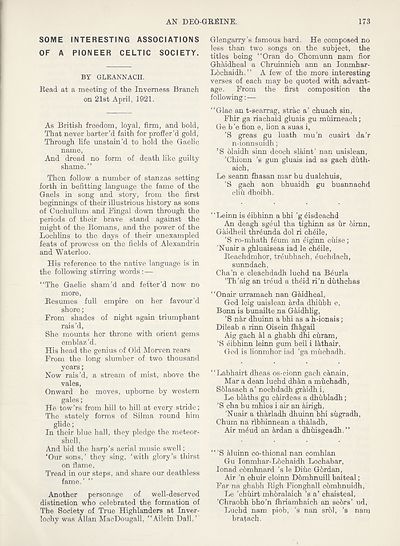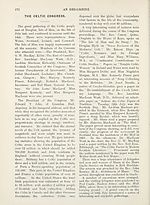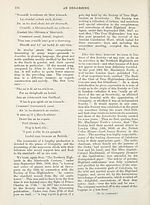An Comunn Gàidhealach Publications > Deo-gréine > Volume 16, October 1920-September 1921
(181) Page 173
Download files
Complete book:
Individual page:
Thumbnail gallery: Grid view | List view

AN DEO-GREINE.
173
SOME INTERESTING ASSOCIATIONS
OF A PIONEER CELTIC SOCIETY.
BY GLEANNACH.
Read at a meeting of the Inverness Branch
on 21st April, 1921.
As British freedom, loyal, firm, and bold,
That never barter’d faith for proffer’d gold,
Through life unstain’d to hold the Gaelic
name,
And dread no form of death like guilty
shame. ”
Then follow a number of stanzas setting
forth in befitting language the fame of the
Gaels in song and story, from the first
beginnings of their illustrious history as sons
of Cuchullum and Fingal down through the
periods of their brave stand against the
might of the Romans, and the power of the
Lochlins to the days of their unexampled
feats of prowess on the fields of Alexandria
and Waterloo.
His reference to the native language is in
the following stirring words: —
“The Gaelic sham’d and fetter’d now no
more,
Resumes full empire on her favour’d
shore;
From shades of night again triumphant
rais’d,
She mounts her throne with orient gems
emblaz’d.
His head the genius of Old Morven rears
From the long slumber of two thousand
years;
Now rais’d, a stream of mist, above the
vales,
Onward he moves, upborne by western
gales;
He tow’rs from hill to hill at every stride;
The stately forms of Silma round him
glide;
In their blue hall, they pledge the meteor-
shell,
And bid the harp’s aerial music swell;
‘Our sons,’ they sing, ‘with glory’s thirst
on flame,
Tread in our steps, and share our deathless
fame.’ ’’
Another personage of well-deserved
distinction who celebrated the formation of
The Society of True Highlanders at Inver-
lochy was Allan MacDougall, “ Ailein Dali, ’
Glengarry’s famous bard. He composed no
less than two songs on the subject, the
titles being “Oran do Chomunn nam fior
Ghkidheal a Chruinnich ann an lonmhar-
Lbchaidh. ’ ’ A few of the more interesting
verses of each may be quoted with advant¬
age. From the first composition the
following: —
“Glac an t-searrag, str&c a’ chuach sin,
Fhir ga riachaid gluais gu muirneach;
Ge b’e fion e, lion a suas i,
’S greas gu luath mu’n cuairt da’r
n-ionnsuidh;
’S olaidh sinn deoch shunt’ nan uaislean,
’Chionn ’s gun gluais iad as gach diith-
aich,
Le seann fhasan mar bu dualchuis,
’S gach aon bhuaidh gu buannachd
eliii dhoibh.
“Leinn is ^ibhinn a bhi ’g ^isdeachd
An deagh sgeul tha tighinn as ur 6imn,
Gaidheil thrdunda dol ri ch&le,
’S ro-mhath feum an eiginn chise;
’Nuair a ghluaiseas iad le ch&le,
Reachdmhor, treubhach, euchdach,
sunndach,
Cha’n e cleachdadh luchd na B^urla
’Th’aig an trend a th&d ri’n duthchas
“Onair urramach nan Gkidheal,
Ged leig uaislean krda dhiiibh e,
Bonn is bunailte na Gkidhlig,
'S nkr dhuinn a bhi as a h-ionais;
Dileab a rinn Oisein fhkgail
Aig gach kl a ghabh dhi cur am,
’S eibhinn leinn gum beil i Ikthair,
Ged is lionmhor iad ’ga muchadh.
“Labhairt dheas os-cionn gach canain,
Mar a dean luchd dhkn a mhchadh,
Solasach a’ nochdadh graidh i,
Le blkths gu ckirdeas a dhubladh;
’S cha bu mhios i air an kirigh,
’Nuair a tharladh dhuinn bhi sugradh,
Chum na rlbhinnean a thkladh,
Air m^ud an krdan a dhuisgeadh.’’
“ ’S kluinn co-thional nan comhlan
Gu lonmhar-Lochaidh Lochabar,
lonad cbmhnard’s le Diiic Gbrdan,
Air ’n chuir cloinn Dbmhnuill baiteal;
Far na ghabh Righ Fionghall cbmhnuidh,
Le ’chuirt mhbralaich’s a’ chaisteal,
’Chraobh bho’n fhriamhaich an sebrs’ ud,
Luchd nam piob, ’s nan srbl, ’s nam
bratach-
173
SOME INTERESTING ASSOCIATIONS
OF A PIONEER CELTIC SOCIETY.
BY GLEANNACH.
Read at a meeting of the Inverness Branch
on 21st April, 1921.
As British freedom, loyal, firm, and bold,
That never barter’d faith for proffer’d gold,
Through life unstain’d to hold the Gaelic
name,
And dread no form of death like guilty
shame. ”
Then follow a number of stanzas setting
forth in befitting language the fame of the
Gaels in song and story, from the first
beginnings of their illustrious history as sons
of Cuchullum and Fingal down through the
periods of their brave stand against the
might of the Romans, and the power of the
Lochlins to the days of their unexampled
feats of prowess on the fields of Alexandria
and Waterloo.
His reference to the native language is in
the following stirring words: —
“The Gaelic sham’d and fetter’d now no
more,
Resumes full empire on her favour’d
shore;
From shades of night again triumphant
rais’d,
She mounts her throne with orient gems
emblaz’d.
His head the genius of Old Morven rears
From the long slumber of two thousand
years;
Now rais’d, a stream of mist, above the
vales,
Onward he moves, upborne by western
gales;
He tow’rs from hill to hill at every stride;
The stately forms of Silma round him
glide;
In their blue hall, they pledge the meteor-
shell,
And bid the harp’s aerial music swell;
‘Our sons,’ they sing, ‘with glory’s thirst
on flame,
Tread in our steps, and share our deathless
fame.’ ’’
Another personage of well-deserved
distinction who celebrated the formation of
The Society of True Highlanders at Inver-
lochy was Allan MacDougall, “ Ailein Dali, ’
Glengarry’s famous bard. He composed no
less than two songs on the subject, the
titles being “Oran do Chomunn nam fior
Ghkidheal a Chruinnich ann an lonmhar-
Lbchaidh. ’ ’ A few of the more interesting
verses of each may be quoted with advant¬
age. From the first composition the
following: —
“Glac an t-searrag, str&c a’ chuach sin,
Fhir ga riachaid gluais gu muirneach;
Ge b’e fion e, lion a suas i,
’S greas gu luath mu’n cuairt da’r
n-ionnsuidh;
’S olaidh sinn deoch shunt’ nan uaislean,
’Chionn ’s gun gluais iad as gach diith-
aich,
Le seann fhasan mar bu dualchuis,
’S gach aon bhuaidh gu buannachd
eliii dhoibh.
“Leinn is ^ibhinn a bhi ’g ^isdeachd
An deagh sgeul tha tighinn as ur 6imn,
Gaidheil thrdunda dol ri ch&le,
’S ro-mhath feum an eiginn chise;
’Nuair a ghluaiseas iad le ch&le,
Reachdmhor, treubhach, euchdach,
sunndach,
Cha’n e cleachdadh luchd na B^urla
’Th’aig an trend a th&d ri’n duthchas
“Onair urramach nan Gkidheal,
Ged leig uaislean krda dhiiibh e,
Bonn is bunailte na Gkidhlig,
'S nkr dhuinn a bhi as a h-ionais;
Dileab a rinn Oisein fhkgail
Aig gach kl a ghabh dhi cur am,
’S eibhinn leinn gum beil i Ikthair,
Ged is lionmhor iad ’ga muchadh.
“Labhairt dheas os-cionn gach canain,
Mar a dean luchd dhkn a mhchadh,
Solasach a’ nochdadh graidh i,
Le blkths gu ckirdeas a dhubladh;
’S cha bu mhios i air an kirigh,
’Nuair a tharladh dhuinn bhi sugradh,
Chum na rlbhinnean a thkladh,
Air m^ud an krdan a dhuisgeadh.’’
“ ’S kluinn co-thional nan comhlan
Gu lonmhar-Lochaidh Lochabar,
lonad cbmhnard’s le Diiic Gbrdan,
Air ’n chuir cloinn Dbmhnuill baiteal;
Far na ghabh Righ Fionghall cbmhnuidh,
Le ’chuirt mhbralaich’s a’ chaisteal,
’Chraobh bho’n fhriamhaich an sebrs’ ud,
Luchd nam piob, ’s nan srbl, ’s nam
bratach-
Set display mode to:
![]() Universal Viewer |
Universal Viewer | ![]() Mirador |
Large image | Transcription
Mirador |
Large image | Transcription
| An Comunn Gàidhealach > An Comunn Gàidhealach Publications > Deo-gréine > Volume 16, October 1920-September 1921 > (181) Page 173 |
|---|
| Permanent URL | https://digital.nls.uk/125656159 |
|---|
| Description | Leabhar 16, Mìos Deireannach an Fhogharaidh 1920 gu Darna Mìos an Fhoghair 1921 |
|---|---|
| Attribution and copyright: |
|
| Description | This contains items published by An Comunn, which are not specifically Mòd-related. It includes journals, annual reports and corporate documents, policy statements, educational resources and published plays and literature. It is arranged alphabetically by title. |
|---|
| Description | A collection of over 400 items published by An Comunn Gàidhealach, the organisation which promotes Gaelic language and culture and organises the Royal National Mòd. Dating from 1891 up to the present day, the collection includes journals and newspapers, annual reports, educational materials, national Mòd programmes, published Mòd literature and music. |
|---|---|
| Additional NLS resources: |
|

